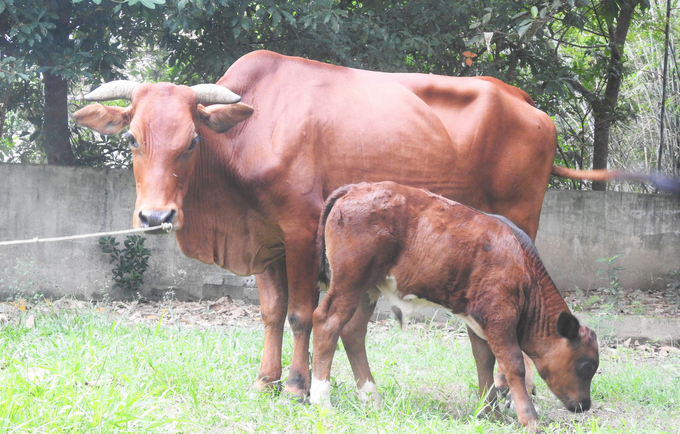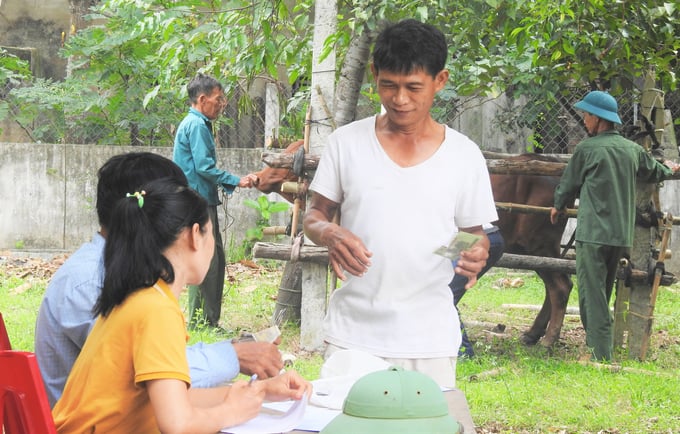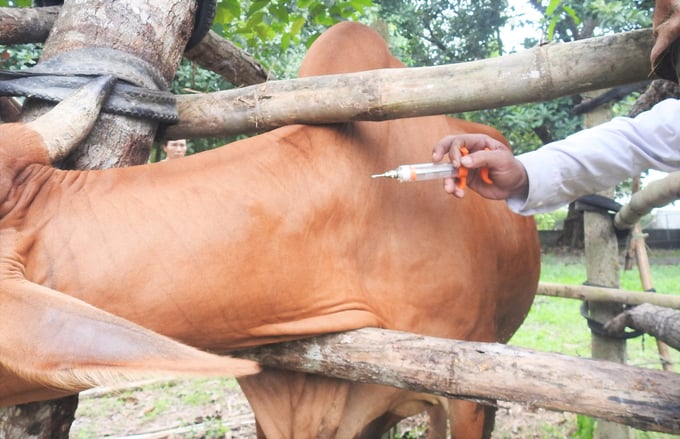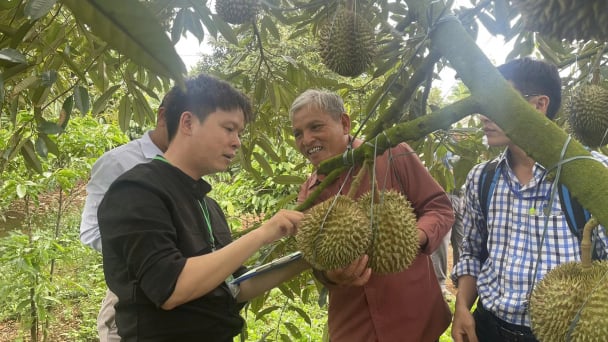May 31, 2025 | 17:24 GMT +7
May 31, 2025 | 17:24 GMT +7
Hotline: 0913.378.918
May 31, 2025 | 17:24 GMT +7
Hotline: 0913.378.918
Since the beginning of the year, outbreaks of lumpy skin disease, foot and mouth disease (FMD), and African swine fever have occurred, and livestock has been infected frequently, causing losses to livestock farmers. Although specialized agencies and localities have detected, controlled, and promptly handled small-scale outbreaks, the strong virulence of the diseases has led to rapid infection rates and difficulty in treatment.

Ha Tinh’s recent situation of the FMD epidemic in cattle shows complicated developments. Photo: Thanh Nga.
In Ky Anh district, from September 14 to September 19, FMD outbreaks occurred consecutively in 3 communes of Ky Bac, Ky Dong, and Ky Giang, causing 39 buffaloes and cows from 21 households to become sick and die.
“I have taken the initiative to report the number of my family’s livestock to the local authorities and registered for vaccination. According to the announcement from the veterinary staff, vaccination is expected to be carried out throughout the commune this week,” said Phan Thi Man, a resident of Kim Son village, Ky Bac commune.
On September 14, seeing the family's 3 cows were not eating well and moving slowly, Hoang Nhat Cuong, also residing in Kim Son village, Ky Bac commune, checked and discovered that the animals were infected with FMD.
Immediately after discovering that the buffaloes and cows were sick, Cuong locked the animals in a barn to isolate, care for them, took additional measures to prevent and control the epidemic. He also went to report to the village in an attempt to deny potential disease widespread.
Currently, the prices of live hogs and cattle have increased by a fair amount, so farms, ranches, and livestock households are increasing the herd and restocking to meet the food demand during Tet. However, the weather is complicated and unpredictable, so the risk of disease outbreak and spread in the coming period is very high. Accelerating the vaccination progress is the leading solution to protect livestock.

People in Can Loc district proactively register to buy vaccines for their livestock. Photo: Thanh Nga.
The directive from the People's Committee of Ha Tinh province states that the vaccination progress for livestock and poultry in the second phase of 2024 must be completed before October 30, with a rate of over 80% of the total herd.
According to Nguyen Hoai Nam, Head of the Veterinary Management Department, Ha Tinh Sub-Department of Livestock Production and Animal Health, this is the season changing period, with alternating rain and sunshine combined with cold and wet weather, creating favorable conditions for pathogens to arise and cause harm. Therefore, the vaccination speed in localities needs to be further accelerated.
“The most important thing is that people must raise awareness, comply with regulations on disease prevention and control, vaccinate livestock and poultry, and apply biosafety measures in animal husbandry. The Sub-Department will promptly provide professional guidance and inspect localities that do not meet requirements to come up with solutions to remedy the situation according to regulations,” said the Head of the Veterinary Management Department.
In Duc Tho district, in the second phase of 2024, the whole district has more than 21,000 livestock vaccinated against FMD, hemorrhagic septicemia, lumpy skin disease, and African swine fever. The herd of buffalo and cows has more than 5,000/10,400 heads vaccinated, the herd of pigs has more than 500/11,500 heads vaccinated.
According to Ha Quang Thang, Deputy Director of Duc Tho Center for Science - Technology Application and Plant and Livestock Protection, in order to ensure the progress of vaccination and achieve high results, the district People's Committee previously directed localities and the agricultural sector to calculate the number of livestock that must be vaccinated, mobilize veterinary staff from communes to establish village-level vaccination teams, and directly go to livestock households to thoroughly perform vaccination.

Ha Tinh People's Committee demands localities complete the second vaccination campaign in 2024 for livestock and poultry before October 30. Photo: Thanh Nga.
“Vaccination of livestock is crucial during this period because this is the transitional weather period when dangerous infectious diseases are very likely to arise. In addition to complying with vaccination regulations, people must regularly monitor the health of their livestock, provide them with adequate nutrition, keep their barns clean, and not buy or keep them with other livestock showing signs of illness in order to limit cross-infection,” said Deputy Director Ha Quang Thang.
Translated by Samuel Pham

(VAN) For the durian industry to succeed, the value chain must fulfill its commitments to the government, the community, and international partners.

(VAN) Vaccinating juvenile pangasius helps reduce disease, antibiotic use, and farming costs, increasing profits for export-oriented farmers in An Giang.

(VAN) Due to a limited supply of workforce and competitive recruitment requirements, businesses struggle to retain talented veterinary human resources.

(VAN) WOAH’s guidance aims to mitigate disease risks through a One Health approach that balances economic, conservation, and public health interests.

(VAN) Ms. Nguyen Thi Dung, Deputy Director of Ngoc Hoang Cooperative, shared about the journey of bringing dragon fruit to Europe, achieving annual revenues in the billions of VND.

(VAN) Bamboo products from Thang Tho Bamboo Cooperative have reached many countries around the world, while also creating jobs for local workers.

(VAN) The Management Board of Con Dao National Park reported that a green sea turtle, tagged in the Philippines, has traveled thousands of kilometers to lay 84 eggs on Bay Canh Islet.